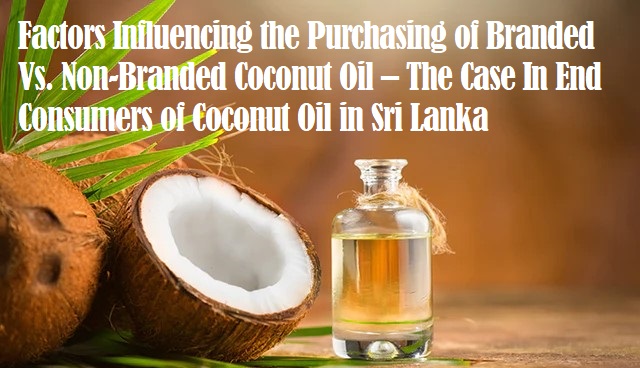Description
ACKNOWLEDGEMET
Executive Summary
CHAPTER 01: INTRODUCTION
1.1 Introduction
1.2 Background of the Study
1.2.1 Marina Foods (Pvt) Limited
1.3 Research Problem
1.4 Performance Gap
1.5 Justification for the research study
1.6 Research Objectives
1.6.1 Primary Objective
1.6.2 Secondary Objective
CHAPTER 02: LITERATURE REVIEW
2.1 Introduction
2.2 Sri Lankan Edible Oil Industry
2.2.1 Coconut oil
2.3 Factors influencing the purchase intention
2.3.1 Product attributes and trust
2.3.2 Brand loyalty
2.3.3 Perceived economic situation
2.3.4 Income
2.3.5 Environmental Influences
2.3.6 Image reputation
2.3.7 Consumer attitudes
2.3.8 Perceived benefits
2.4 Factors influencing the Purchase Intention in relation with Coconut oil
CHAPTER 03: METHODOLOGY
3.1 Introduction
3.2 Purpose of the study
3.3 Conceptualization of the study
3.4 Operationalization
3.4.1 Perceived benefits and product attributes
3.4.2 Brand Loyalty
3.4.3 Trust
3.4.5 Customer attitudes
3.4.6 Environmental influences
3.4.7 Image reputation
3.4.8 Purchase intention
3.5 Hypotheses Development
3.6 Measurement and Data Analysis Methods
3.7 Research Design
3.8 Researcher Interference
3.9 Study Setting
3.10 Unit of Analysis
3.11 Time Horizon
3.12 Sample Design
3.12.1 Population
3.12.2 Sampling element
3.12.3 Sampling Unit
3.12.4 Time
3.12.5 Sampling Technique
3.12.6 Sample Size
3.13 Data Collection
3.13.1 Data Collection Method
3.14 Measurement and measures
3.14.1 Scaling
3.14.2 Coding
3.15 Reliability
3.16 Summary
CHAPTER 04: DATA PRESENTATION AND ANALYSIS
4.1 Introduction
4.2 Analyzing the Sampling Profile
4.2.1 Filtering Question
4.2.2 Gender Composition
4.2.3 Age Composition
4.2.4 Educational Level
4.2.5 Average Monthly Income of the Respondents
4.3 Normality Test of Variables
4.4 Analysis of the Variables through Regression
4.4.1 Independent Variables
4.4.2 Multiple Regression Model
4.5 Summary
CHAPTER 05: CONCLUSITIONS AND RECOMMENDATIONS
5.1 Introduction
5.2 Findings and Recommendations
5.2.1 Objective One
5.2.2 Objective Two
5.2.3 Objective Three
5.2.5 Objective Five
5.2.6 Objective Six
5.2.7 Objective Seven
5.2.8 Objective Eight
5.3 Research Limitations and Further Research Areas
5.4 Conclusions
5.5 Summary





